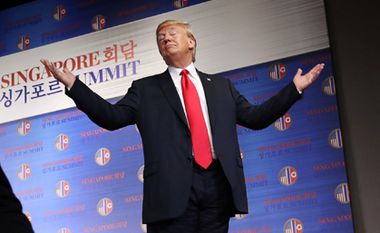It was the mother of all press conferences! For over an hour United States President Donald Trump answered questions about his meeting with North Korean leader Kim Jong-un, from a sceptical US media and, interestingly, a friendly Asian (one Chinese, one South Korean and one Singaporean) media. The Asians sounded grateful that Trump had taken this initiative. The Americans were not willing to believe that he was not all bluff and bluster.
Within minutes of the US-North Korea joint statement being read out, television channels and Twitter were flooded with scepticism. Look, he pokes a friendly neighbour in the eye one day and trusts a hostile dictator the next. The deal with Kim will, of course, be the real test of Trump’s diplomacy. If his ‘Trumplomacy’ clicks and Kim delivers, he may well secure a second term, or at least a Nobel Peace Prize. If Kim goes home and has memory loss, Trump will be Jimmy Carter Mark II. President Carter put his eggs in the Iran deal basket and faced ignominy. Trump has placed his diplomatic eggs in the Korean deal. Much is at stake in the Kim deal for US relations with China, Japan, South Korea and, indeed, much of Asia. This tail will wag the dog.
Trumplomacy is not all bluff and bluster, even if America’s East Coast liberals and the Washington, DC, foreign policy establishment think so. At its core lies Trump’s ‘America First’ policy. It still sells, at home. No one can take the US for granted. Neither foe nor friend. When asked who would pay for the cost of North Korean denuclearisation, Trump was quick to answer—Japan, South Korea and China! After all, they are the primary beneficiaries of a denuclearised North Korea.
That has been Trump’s message to European members of NATO. You want security cover, pay for it or go get it for yourself. Only Japan’s Shinzo Abe has tried to take that message seriously and get his people to help him amend Japan’s constitution so that the government can fund and raise a regular army, air force and navy. But, even Abe has found it difficult and has had to go soft on China. Trump is not yet ready to pull US troops out of South Korea, but has said he will stop funding war games. The DC thinkers and CNN commentators were aghast! If the two Koreas make up, who needs the war games?
Incidentally, Trump was right to ask why Russia was not present at the G7 table. The G7 is an anachronism anyway. The US could get more out of Russia being part of that group than Canada or Italy. That is the point of Trumplomacy. It asks some basic questions about global balance of power that can be very discomfiting for yesterday’s powers and puzzling to tomorrow’s.
Trumplomacy implies, on the one hand, increased self-reliance in defence among US allies and, on the other, the shift from ‘free trade’ rules to ‘fair trade’ rules. If Canada’s overly smart prime minister does not get it, he will be shamed. “We are America, bitch!”—as one Trumplomat explained to a DC think-tanker. That admonishment of Trudeau Junior was also a message to Kim Sub-Junior.
If Trump sceptics are proved right and Kim does not deliver on his promises, both the US president and American prestige will take a beating. If, however, Kim has reasons to deliver and keeps his side of the promise, it will not only boost Trump’s image, but will alter the dynamics of Asian security. The Singapore summit is, therefore, a true test for Trumplomacy.
Indian foreign and trade policy makers should draw appropriate lessons. Trump can be a friend to India, but he can hurt India, too. Recent statements of Commerce and Industries Minister Suresh Prabhu on US-India trade issues were aimed at soothing ruffled American feathers. On the other hand, Prime Minister Narendra Modi has been smart enough to spread India’s diplomatic eggs around. His recent overtures to Chinese President Xi Jinping and Russian President Vladimir Putin should be viewed as such. Not as a “strategic reset” as part of some ‘grand strategy’, but as smart risk management. International relations scholars require a quick lesson in risk and uncertainty so that they can explain rational national decisions in a changing world more intelligently than to theorise on thin evidence.
Baru is an economist and a writer.
He was adviser to former prime minister Manmohan Singh.


